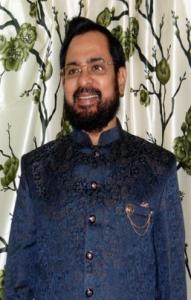
Detachment as a Discipline Offers a Fresh Perspective on Prioritizing What Matters

Shri Shri Thakur Balak Brahmachari
JERSEY CITY, NJ, UNITED STATES, June 3, 2025 /EINPresswire.com/ -- In a recently delivered spiritual discourse, Dr. Shib Shankar Datta (Shri Shri Shunyojyoti) offers a fresh perspective on prioritizing what truly matters in life. Drawing from spiritual wisdom and introspection, the talk—translated by Dr. Ranita Ganguly—explores the role of detachment, free will, and the conscious alignment of the individual with the universe.
To be productive, we need to understand what matters to us, and for that reason, we need to master the art of saying ‘No’ to certain things, or, to be more precise, to say ‘No’ to things that we encounter in our lives. One needs to understand, most genuinely and exuberantly, how short and fragile our Lives are, so one needs to respect time as it is more valuable than money. So before doing anything, we need to ask ourselves with all sensitivity, in all seriousness, this magic question: “Is it necessary and helpful to me in the real sense in the long run?” The problem with us lies in our hesitation to say “NO” to unnecessary things. Waves after waves of absolutely unnecessary wishes are generated inside us, and we are driven by them by pure consequentialities, which only leads to more attachment, more suffering, more pain, and more misery. Still, we can’t say “No” to them, as we are habituated to saying “YES” to unimportant and unnecessary things in life. We miss investing that time in saying “YES” to the crucial things in life and to those things that should matter to us. Spiritual giants subscribe to the idea of doing less. In practice, it is essential to follow the concept of doing less. By doing less, one is prevented from wasting unnecessary energy.
Society says quite the opposite. It suggests that the more you do, the more you achieve, and the more you can do, the more you can achieve from a worldly perspective. However, at the end of our lives, we realize that doing much and achieving many have never made us more productive and have ultimately failed to bring us lasting peace. The reason we say ‘Yes’ to most of those essential things in life springs mostly from our fear and greed. Suppose one of our close ones or a friend suggests doing something; it is this fear of missing out, letting down, or losing our close one that prompts us to abide by their suggestions. Therefore, instead of standing tall and saying “No,” we succumb to their pressure as the closeness seems valuable to us.
If we investigate sincerely and deeply, we can identify the process of attaching excessive value to someone who is actually of no worth, which arises from habitual norms and baggage from past deeds that are unnecessary. The most pertinent question that arises now is what should be valuable to us, and this answer varies from person to person. That is where the individual's actual spiritual metal comes into play. The more spiritually wise one is, the more one will be able to appreciate what is truly valuable to us. Therefore, we should channel ourselves into doing the most beneficial work, which is to remember the ever-conscious Cosmic Void from which all creations emerged. Every activity leaves a powerful and lasting impression on us both in the waking state and the dream state. Thakur says that in the end, it is only free will that we can claim solely as our own and have total ownership, while every other thing is borrowed. Thakur perceives the universe as a conscious whole that communicates with us through our conscience. Therefore, the idea of conscience can be manifested as free will, which is the fundamental part of the creation. The creation as a whole can be looked upon as Nature, which is overwhelmingly conscious and has free will with a universal conscience.
Thakur looks to individual living entities as the seeds of the universe or creation. Like every seed of a tree holds the promise and potential of growth and also outgrow the mother tree, similarly, every living entity has the capability and possibilities to equal the Mother Universe and even surpass her when necessary. To be one with the Mother Universe, the individual entity must perfectly align its own free will with the free will of the Mother Universe or Nature. The cosmic conscience of the Mother Universe or Nature can be seen as the most advanced and sophisticated culmination of Mother Nature’s own free will. As the seed of the all-encompassing Mother Universe, we can harmoniously be equivalent to Mother Nature, matching her every feature to become one with the universe. Therefore, whenever we are in contemplation of Thakur, we are employing our free will in the most effective way possible by trying to align our consciousness with the marvelous consciousness of Mother Nature. Thus, only by meditating upon Him can we be set on the right path to appreciate and filter what should be most valued and what is not.
Derived from divine discourse by Dr. Shib Shankar Datta (Shri Shri Shunyojyoti)
Translated by Dr. Ranita Ganguly
Gianmarco Giordaniello
Xraised
email us here
Visit us on social media:
LinkedIn
Instagram
X
Distribution channels: Business & Economy, Companies, Education, Environment, Human Rights
Legal Disclaimer:
EIN Presswire provides this news content "as is" without warranty of any kind. We do not accept any responsibility or liability for the accuracy, content, images, videos, licenses, completeness, legality, or reliability of the information contained in this article. If you have any complaints or copyright issues related to this article, kindly contact the author above.
Submit your press release
